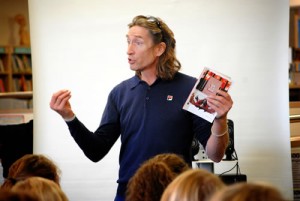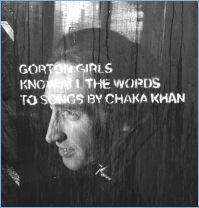The first two workshops for the Young Carers Project was facilitated by Mike Garry, and then Michelle Green. It was a great experience to watch their sessions, and see how much the YCs (Young Carers) enjoyed them and developed their writing and performance skills.
I’ve know Mike Garry for years through literary events in Manchester, and he’s given some inspiring talks when I worked at Bolton University, so I wasn’t disappointed with his workshop. Below is a photo of Mike at another reading.
I’ve taught creative writing in a number of guises at universities over the past few years, and this kind of teaching tends to foreground ‘workshopping’ students’ writing rather than focus on generating writing in the session. Workshopping is as you probably know, when a group of students and a tutor discuss a piece of writing, and give feedback on it. Though this is an often disputed method, it still dominates most university courses. This might be because they mostly started at MA level, when a writer is expected to have some experience of writing. This has been replicated at BA level, and at places such as Lancaster, used even in Year One. Students are expected to be ready for workshopping even at the tender age if eighteen. It is a gruelling process, and my memories of it at BA level are of avoiding it. I actually stopped attending my workshops because they upset me. I was an overly sensitive soul. So the past couple of weeks of having a completely different approach have been a refreshing change. I have some experience of community workshops, and I veer away from workshopping in them. The focus is on producing writing, and enabling people who have had little experience of writing gain confidence in themselves.
Mike Garry’s approach draws the participants in by foregrounding his own experience of literature and writing, and why writing gives you a voice.
‘I don’t think poetry has to be about abstract things. It can be about real lives and central to us. When we write a poem we say here’s a bit of me.’ Mike Garry
Mike also draws the YCs in through his poems. He performs in the workshop and asks them to engage with what he’s trying to write about. His poem ‘Signify’ nicely drew us into thinking about our favourite teacher at school. I called her mam once.
I tend to shy away from sharing my own work in workshops. I sometimes feel I’d be showing off, but after watching Mike’s session, I think this could be wrong. In fact, sharing your own writing can be the opposite of this. Mike’s openness about sharing his work with people is very encouraging to new writers. I’m just like you, he infers, and your can do this too. Literature is not owned by adults, by the rich, by others. Words are yours too. When you know words, and learn more words, this gives you power. You’re able to articulate yourself. You can do this too.
‘Writing poetry isn’t a job, it’s something I’ve got to do. If I don’t do it, I get poorly. I write to understand things. If something makes me feel strange, I want to write about it. When my head’s battered, it’s questions bothering me. Writing makes me explore those questions.’
Mike’s method involves asking the YCs to write down words during his readings. I think this helps to listen and focus on them, and they write down the words they like or that ‘sound good’ to them. What I liked was his way of breaking down the process of writing a poem to a list of words.
‘Words are very important because they help us express and communicate how we feel. When we have words and collect words like this, it makes writing easier. When I say the word red, what do you think of? Everyone will think of a different word because we are all unique and special.’
This was Mike’s writing task:
Think of either a tragic or joyous situation that either you or someone else was involved in.
think about the situation and what the story is. Most poems are tiny stories, tiny narratives.
Write down ten words about that situation.
write them in order
‘What’s good about poetry is its a way of saying something but subtly. You can use subtle words to imply what you are saying.’
What does writing this story make you feel? Write down ten words.Can you find a narrative in the words you have written down?
Write these words in order, in a story or narrative.
Two hours is never enough for a workshop (though three always feels a little too long). Mike finished with some breathing exercises, which the YC’s really loved. The exercises helped to slow their readings down, give them confidence and gave a sense of fun to reading aloud. He got us all breathing slowly and stretching our arms. The following week, Michelle Green developed these exercises much more, and I realised where I’d been going wrong all these years with my own public readings.
‘The key to reading a poem is not being embarrassed. Stand up tall. Everyone listening wants you to do well. Read slowly. Don’t rush. Pronounce your words clearly. And make sure you practice. It really makes a difference.’
In my next post, I’ll share Michelle Green’s approach, as well as tell you more about the awesome young carers involved with the project.

